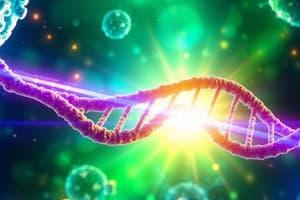Podcast
Questions and Answers
What is the primary function of chloroplasts in a cell?
What is the primary function of chloroplasts in a cell?
How do biologists use genetic data to study relationships between species?
How do biologists use genetic data to study relationships between species?
What is one of the essential components found in the nucleus of a cell?
What is one of the essential components found in the nucleus of a cell?
What does natural selection primarily act upon in driving species change?
What does natural selection primarily act upon in driving species change?
Signup and view all the answers
Which branch of biology explores the inheritance of traits from one generation to the next?
Which branch of biology explores the inheritance of traits from one generation to the next?
Signup and view all the answers
In biology, what is the fundamental unit of life?
In biology, what is the fundamental unit of life?
Signup and view all the answers
What is the molecular structure that serves as the blueprint for all living beings?
What is the molecular structure that serves as the blueprint for all living beings?
Signup and view all the answers
Which kingdom of life includes multicellular organisms that lack cell walls?
Which kingdom of life includes multicellular organisms that lack cell walls?
Signup and view all the answers
What is the fundamental principle in biology that outlines the flow of genetic information?
What is the fundamental principle in biology that outlines the flow of genetic information?
Signup and view all the answers
Which kingdom of life is autotrophic and uses photosynthesis to produce its own food?
Which kingdom of life is autotrophic and uses photosynthesis to produce its own food?
Signup and view all the answers
Which kingdom of life encompasses bacteria and archaea?
Which kingdom of life encompasses bacteria and archaea?
Signup and view all the answers
Which type of organisms include single-celled and multicellular eukaryotes?
Which type of organisms include single-celled and multicellular eukaryotes?
Signup and view all the answers
Study Notes
Exploring the Many Facets of Science: A Journey Through Biology
Science is a vast and dynamic field, encompassing a multitude of disciplines that enable us to understand and engage with the world around us. One of the most captivating and far-reaching branches of science is biology, which explores the complexities of living organisms and their interactions with the environment.
Life's Building Blocks: The Central Dogma and DNA
Life's foundation is the molecular structure called deoxyribonucleic acid (DNA), which is the blueprint for all living beings. DNA contains the instructions for building and maintaining living organisms. The central dogma, a fundamental principle in biology, outlines the flow of genetic information from DNA to ribonucleic acid (RNA) and ultimately to proteins that carry out the functions of cells and organisms.
The Diverse Kingdoms of Life
Life is divided into five kingdoms: Animals, Plants, Fungi, Protists, and Monera. Each kingdom features distinct characteristics and types of organisms. For example, animals are multicellular organisms that lack cell walls, while plants are autotrophic organisms that use photosynthesis to produce their own food. Fungi are heterotrophic organisms, consuming dead or decaying matter. Protists are diverse organisms that include single-celled and multicellular eukaryotes, while Monera is the kingdom of bacteria and archaea.
The Cellular Basis of Life
Cells are the fundamental units of life, and each cell contains the essential components for life, including the nucleus, which houses DNA, and organelles, which carry out specific functions. Plants and some protists also have chloroplasts, the organelles responsible for photosynthesis. Each cell in a multicellular organism specializes to perform specific tasks, creating a highly coordinated and complex system.
The Evolution of Species
Biology also seeks to understand the evolution of species, the mechanisms that drive change over time, and the emergence of new life forms. Evolution is the process by which species change over long periods of time, and natural selection is one of the primary forces driving this change. Biologists study fossils, genes, and anatomy to piece together the evolutionary history of life on Earth.
Genetics and Populations
Genetics is a branch of biology that explores the inheritance of traits and the transmission of genetic information from one generation to the next. Genetic variation within populations, the difference in the genetic makeup of individuals within a group, is a primary factor driving evolution. Biologists use genetic data to understand the relationships between species and to investigate the genetic basis of complex traits.
Applications of Biology
Biology has a wide range of applications, from medical research and the development of new treatments for diseases, to the study of ecology and the sustainable management of natural resources. Biologists also investigate the behavior and evolution of organisms, contributing to our understanding of the natural world and the complex interactions among species.
Biology is a discipline that continues to evolve and expand our knowledge of life and its processes. As we delve deeper into its mysteries, new insights and technologies emerge, offering the potential for remarkable breakthroughs in medicine, agriculture, and environmental science, and providing us with a richer understanding of our place in the world.
Studying That Suits You
Use AI to generate personalized quizzes and flashcards to suit your learning preferences.
Description
Dive into the captivating world of biology, from the central dogma explaining DNA's role to the evolution of species over time. Explore the diverse kingdoms of life, understand the cellular basis of existence, and uncover the applications of biology in various fields.




